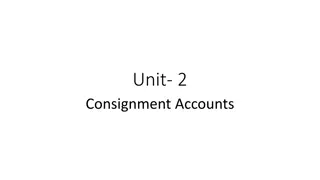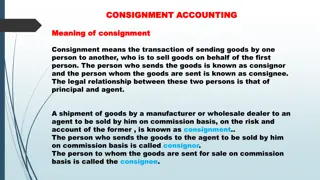Understanding Consignment Accounts in Business
Consignment accounts involve the sending of goods by a consignor to a consignee for sale on the consignor's behalf. The consignor remains the owner of the goods until they are sold, and the consignee sells the goods, collects money from customers, and receives commissions. Various types of commissio
9 views • 22 slides
Understanding Consignment in Accounting
Consignment in accounting involves sending goods from a consignor to a consignee for sale on commission basis. The consignor retains ownership until the goods are sold. The relationship is that of principal and agent, with the consignee handling sales and remitting net proceeds. Important terms incl
1 views • 7 slides
Valuation and Accounting for Unsold Stock in Consignment Transactions
Valuation and accounting for unsold stock in consignment transactions is crucial for determining true profit or loss. The cost of consigned goods plus proportionate expenses must be considered. Recurring and non-recurring expenses play a significant role in valuing closing stock. The value of unsold
1 views • 10 slides


